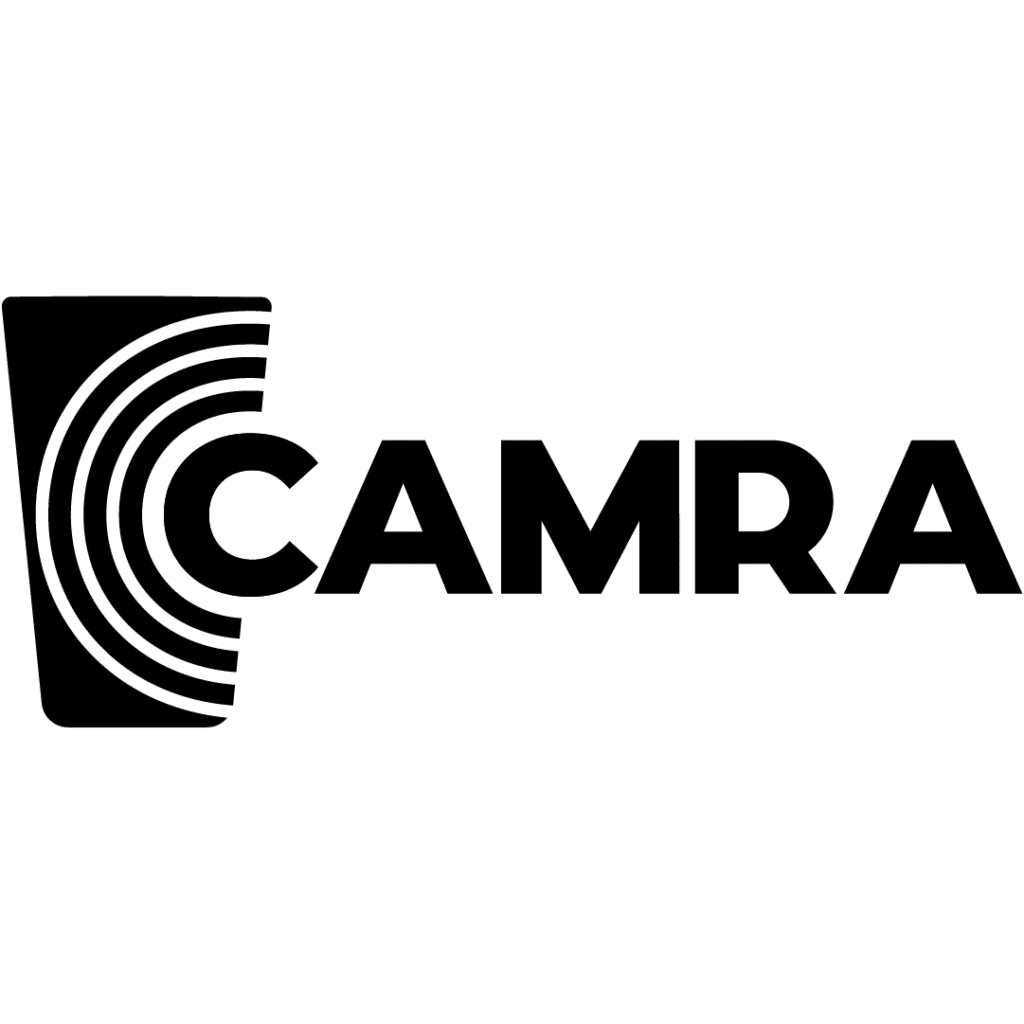Pub history
The John Jacques
Previously a branch of the Portsea Island Mutual Co-operative Society (PIMCO), the name of this pub recalls PIMCO’s former chief executive who died in 1995 aged 90. PIMCO was set up by a handful of volunteers in May 1873 – the first Fratton Road shop opening in 1887. It was the first of many PIMCO premises in Fratton Road, including this site. From the end of World War II, PIMCO’s driving force for 20 years was its chief executive John Jacques, later Lord Jacques of Portsea Island.
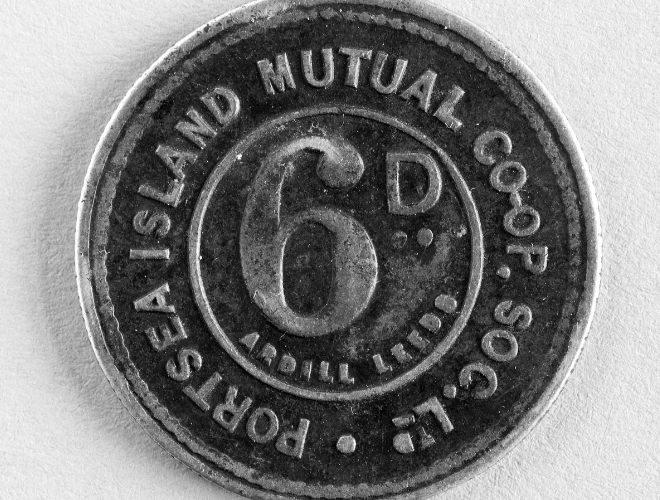
Previously a branch of the Portsea Island Mutual Co-operative Society (PIMCO), the name of this pub recalls PIMCO’s former chief executive who died in 1995 aged 90. PIMCO was set up by a handful of volunteers in May 1873 – the first Fratton Road shop opening in 1887. It was the first of many PIMCO premises in Fratton Road, including this site. From the end of World War II, PIMCO’s driving force for 20 years was its chief executive John Jacques, later Lord Jacques of Portsea Island.
Illustrations and text about George Meredith
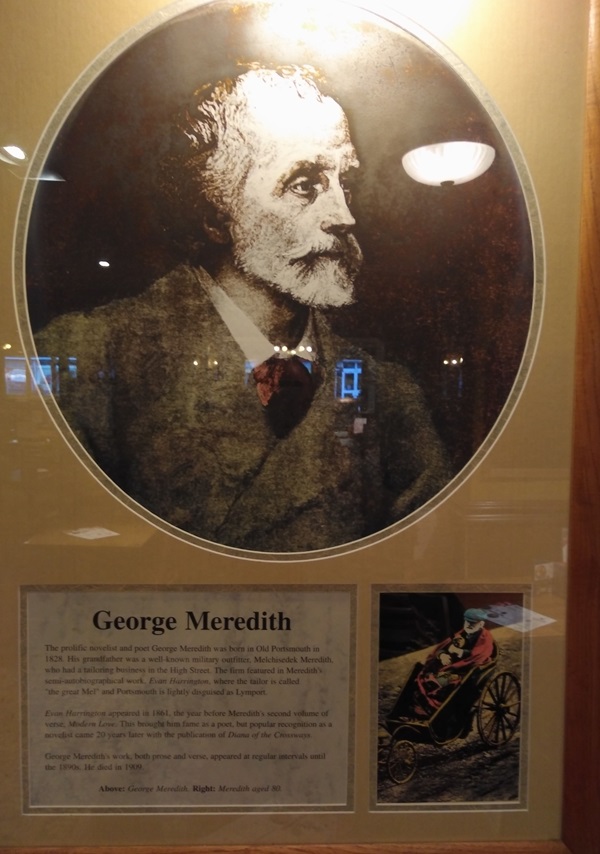
The text reads: The prolific novelist and poet George Meredith was born in Old Portsmouth in 1828. His grandfather was a well-known military outfitter, Melchisedek Meredith, who had a tailoring business in High Street. The firm featured in Meredith’s semi-autobiographical work, Evan Harrington, where the tailor is called ‘the great Mel’ and Portsmouth is lightly disguised as Lymport.
Evan Harrington appeared in 1861, the year before Meredith’s second volume of verse, Modern Love. This brought him fame as a poet, but popular recognition as a novelist came 20 years later with the publication of Diana of the Crossways.
George Meredith’s work, both prose and verse, appeared at regular intervals until the 1890s. He died in 1909.
Above: George Meredith
Right: Meredith aged 80
Photographs, prints and text about Dr Arthur Conan Doyle
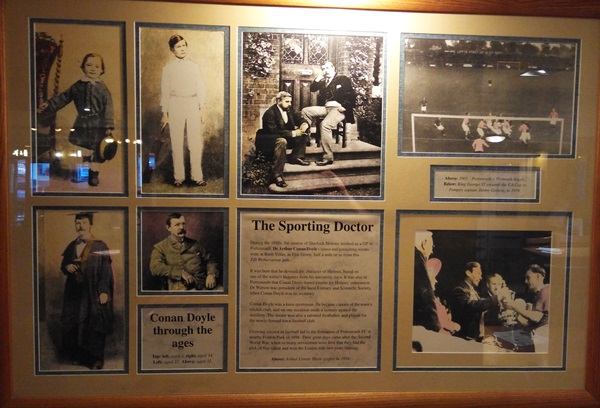
The text reads: During the 1880s, the creator of Sherlock Holmes worked as a GP in Portsmouth. Dr Arthur Conan Doyle’s house and consulting rooms were at Bush Villas, in Elm Grove, half a mile or so from this J D Wetherspoon pub.
It was here that he devised the character of Holmes, based on one of the writer’s lecturers from his university days. It was also in Portsmouth that Conan Doyle found a name for Holmes’ companion. Dr Watson was president of the local Literary and Scientific Society when Conan Doyle was its secretary.
Conan Doyle was a keen sportsman. He became captain of the town’s cricket club, and on one occasion made a century against the Artillery. The doctor was also a talented footballer and played for the newly formed town football club.
Growing interest in football led to the formation of Portsmouth FC at nearby Fratton Park in 1898. Their great days came after the Second World War, when so many servicemen were here that they had the pick of fine talent and won the league title two years running.
Top, left: Aged 4
Top, right: Aged 14
Left: Aged 22
Above: Aged 32
Above: Arthur Conan Doyle (right) in 1894
Above: 1905 – Portsmouth v. Plymouth Argyle
Below: King George VI presents the FA Cup to Pompey captain Jimmy Guthrie in 1939
Prints, illustrations and text about trade and industry in Portsmouth
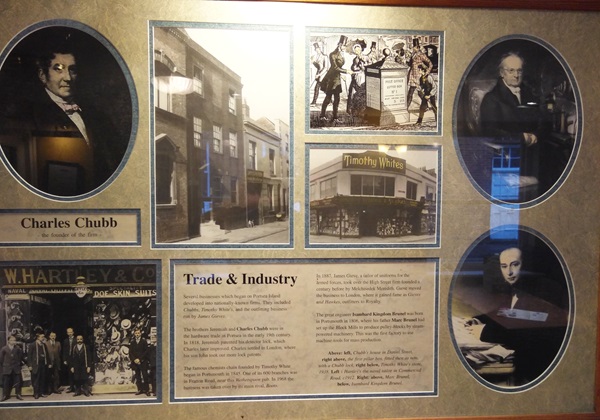
The text reads: Several businesses which began on Portsea Island developed into nationally known firms. They included Chubbs, Timothy White’s, and the outfitting business run by James Gieves.
The brothers Jeremiah and Charles Chubb were in the hardware trade in Portsea in the early 19th century. In 1818, Jeremiah patented his detector lock, which Charles later improved. Charles settled in London, where his son John took out more lock patents.
The famous chemist chain founded by Timothy White began in Portsmouth in 1845. One of its 600 branches was in Fratton Road, near this Wetherspoon pub. In 1968 the business was taken over by its main rival, Boots.
In 1887, James Gieve, a tailor of uniforms for the armed forces, took over the High Street firm founded a century before Melchisedek Meredith. Gieve moved the business to London, where it gained fame as Gieves and Hawkes, outfitters to royalty.
The great engineer Isambard Kingdom Brunel was born in Portsmouth in 1806, where his father Marc Brunel had set up the Block Mills to produce pulley blocks by steam-powered machinery. This was the first factory to use machine tools for mass production.
Above, left: Chubb’s house in Daniel Street
Above, right above: The first pillar box, fitted then as now with a Chubb lock
Above, right below: Timothy White’s store, 1938
Left: Hartley’s the naval tailor in Commercial Road, c1912
Right, above: Marc Brunel
Right, below: Isambard Kingdom Brunel
Prints and text about Portsea Island Mutual Co-operative Society
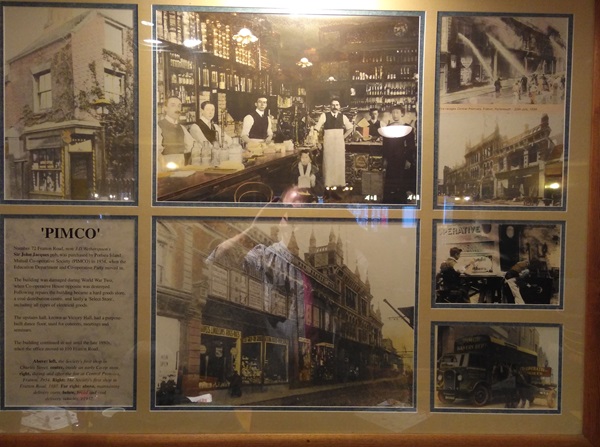
The text reads: Number 72 Fratton Road, now J D Wetherspoon’s Sir John Jacques pub, was purchased by Portsea Island Mutual Co-operative Society (PIMCO) in 1934, when the Education Department and Co-operative Party moved in.
The building was damaged during World War Two, when Co-operative House opposite was destroyed. Following repairs, the building became a hard goods store, a coal distribution centre, and lastly a ‘Select Store’, including all types of electrical goods.
The upstairs hall, known as ‘Victory Hall’, had a purpose-built dance floor, used for concerts, meetings and seminars.
The building continued in use until the late 1980s, when the office moved to 110 Fratton Road.
Above, left: the society’s first shop in Charles Street
Above, centre: Inside an early Co-op store
Above, right: During and after the fire at Central Premises, Fratton, 1934
Right: The society’s first shop in Fratton Road, 1887
Far right, above: Maintaining delivery carts
Far right, below: Bread and coal delivery vehicles, c1937


